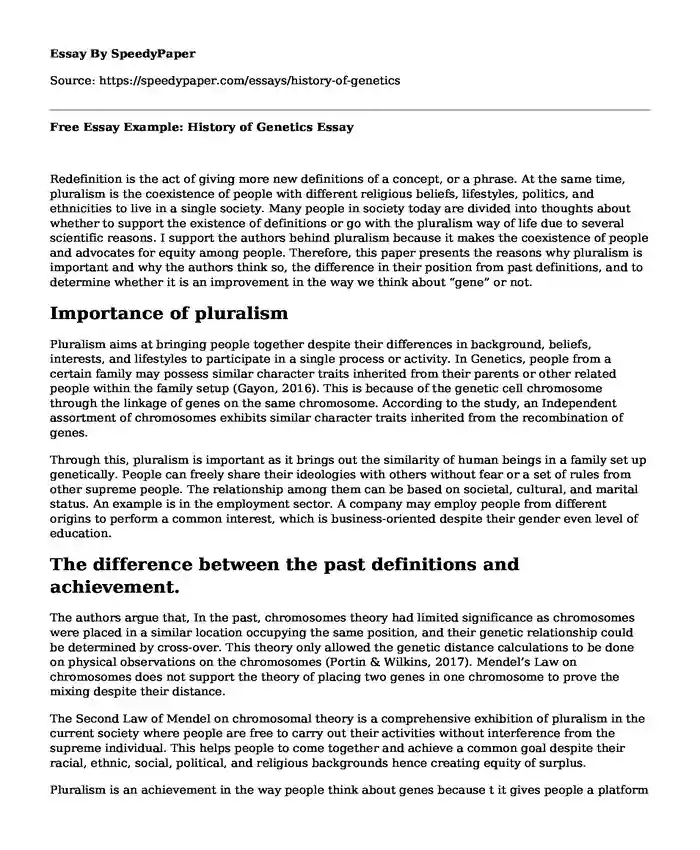
| Essay type: | Persuasive essays |
| Categories: | Genetics Religion Multiculturalism Essays by wordcount |
| Pages: | 3 |
| Wordcount: | 597 words |
Redefinition is the act of giving more new definitions of a concept, or a phrase. At the same time, pluralism is the coexistence of people with different religious beliefs, lifestyles, politics, and ethnicities to live in a single society. Many people in society today are divided into thoughts about whether to support the existence of definitions or go with the pluralism way of life due to several scientific reasons. I support the authors behind pluralism because it makes the coexistence of people and advocates for equity among people. Therefore, this paper presents the reasons why pluralism is important and why the authors think so, the difference in their position from past definitions, and to determine whether it is an improvement in the way we think about “gene” or not.
Importance of pluralism
Pluralism aims at bringing people together despite their differences in background, beliefs, interests, and lifestyles to participate in a single process or activity. In Genetics, people from a certain family may possess similar character traits inherited from their parents or other related people within the family setup (Gayon, 2016). This is because of the genetic cell chromosome through the linkage of genes on the same chromosome. According to the study, an Independent assortment of chromosomes exhibits similar character traits inherited from the recombination of genes.
Through this, pluralism is important as it brings out the similarity of human beings in a family set up genetically. People can freely share their ideologies with others without fear or a set of rules from other supreme people. The relationship among them can be based on societal, cultural, and marital status. An example is in the employment sector. A company may employ people from different origins to perform a common interest, which is business-oriented despite their gender even level of education.
The difference between the past definitions and achievement.
The authors argue that, In the past, chromosomes theory had limited significance as chromosomes were placed in a similar location occupying the same position, and their genetic relationship could be determined by cross-over. This theory only allowed the genetic distance calculations to be done on physical observations on the chromosomes (Portin & Wilkins, 2017). Mendel’s Law on chromosomes does not support the theory of placing two genes in one chromosome to prove the mixing despite their distance.
The Second Law of Mendel on chromosomal theory is a comprehensive exhibition of pluralism in the current society where people are free to carry out their activities without interference from the supreme individual. This helps people to come together and achieve a common goal despite their racial, ethnic, social, political, and religious backgrounds hence creating equity of surplus.
Pluralism is an achievement in the way people think about genes because t it gives people a platform to express themselves and coexist peacefully. An example is in the political background in society today, where people are free to practice their voting rights without considering their differences in background.
Conclusion
In modern society, pluralism remains the best definition in genetics about genes despite the negative approaches from some authors against it, and their arguments are not based on inheritance. Some authors argue that genetics theories are to interfere with the existing gene concept and do away with genetics. Pluralism aims at bringing people together despite their differences in background, beliefs, interests, and lifestyles to participate in a single process or activity.
References
Gayon, J. (2016). From Mendel to epigenetics: History of genetics. Comptes rendus biologies, 339(7-8), 225-230.
Portin, P., & Wilkins, A. (2017). The evolving definition of the term "gene." Genetics, 205(4), 1353-1364.
Cite this page
Free Essay Example: History of Genetics. (2023, Nov 03). Retrieved from https://speedypaper.com/essays/history-of-genetics
Request Removal
If you are the original author of this essay and no longer wish to have it published on the SpeedyPaper website, please click below to request its removal:
- Research Paper Example about Bullying
- Teaching Communication Skills to Students with Autism
- Free Essay Sample on Abstract Concept About Love
- Comparison Essay Sample: Diesel Versus Gas Cars
- Gap Inc. Company: Marketing Essay Example
- Essay Example about Accounting Fraud in Volkswagen
- Free Essay on Mass Spectroscopy and Electrochemistry
Popular categories




